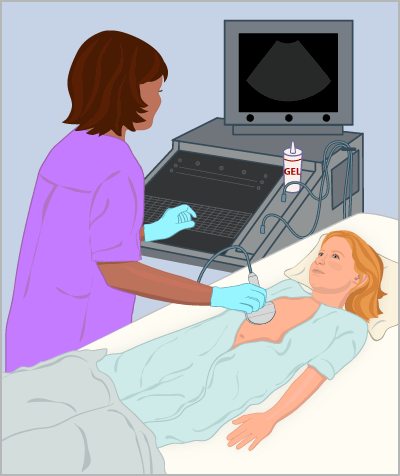- Parents Home
- Para Padres
- A to Z Dictionary
- Allergy Center
- Asthma
- Cancer
- Diabetes
- Diseases & Conditions
- Doctors & Hospitals
- Emotions & Behavior
- First Aid & Safety
- Flu (Influenza)
- Food Allergies
- General Health
- Growth & Development
- Heart Health & Conditions
- Homework Help Center
- Infections
- Newborn Care
- Nutrition & Fitness
- Play & Learn
- Pregnancy Center
- Preventing Premature Birth
- Q&A
- School & Family Life
- Sports Medicine
- Teens Home
- Para Adolescentes
- Asthma
- Be Your Best Self
- Body & Skin Care
- Cancer
- Diabetes
- Diseases & Conditions
- Drugs & Alcohol
- Flu (Influenza)
- Homework Help
- Infections
- Managing Your Weight
- Medical Care 101
- Mental Health
- Nutrition & Fitness
- Q&A
- Safety & First Aid
- School, Jobs, & Friends
- Sexual Health
- Sports Medicine
- Stress & Coping
Ultrasound: Abdomen
What Is an Ultrasound?
An ultrasound scan is a medical test that uses high-frequency sound waves to create live images from the inside the body. Also called a sonogram or sonography, ultrasounds let doctors see the body’s soft tissues, which X-rays can’t do.
Doctors order ultrasounds for many reasons, such as to look for the causes of pain, swelling, and infection. Ultrasound scans are safe and painless.
What Is an Abdominal Ultrasound?
An abdominal ultrasound uses sound waves to make images of the abdomen (belly).
An ultrasound machine sends sound waves into the abdominal area and images are recorded on a computer. The black-and-white images show internal structures such as the appendix, intestines, liver, gall bladder, pancreas, spleen, kidneys, and bladder.
Why Are Abdominal Ultrasounds Done?
Doctors order an abdominal ultrasound when they're concerned about symptoms such as belly pain, repeated vomiting, abnormal liver or kidney function tests, or a swollen belly. The tests can show them the size of the abdominal organs and help them check for injuries to or diseases of the organs.
Abdominal ultrasounds can help doctors look for:
- appendicitis
- pyloric stenosis
- kidney stones or gallbladder stones
- masses such as tumors, cysts, or abscesses
- abnormal fluid in the abdomen
Doctors can also use an abdominal scan to guide them during procedures such as needle biopsies or catheter insertion.
A complete ultrasound of the abdomen checks all the abdominal organs. A limited ultrasound checks one or multiple organs, but not all.
What if I Have Questions?
If you have questions about the abdominal ultrasound or what the test results mean, talk to your doctor.


© 1995- The Nemours Foundation. KidsHealth® is a registered trademark of The Nemours Foundation. All rights reserved.
Images sourced by The Nemours Foundation and Getty Images.
